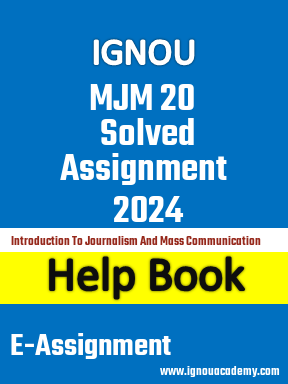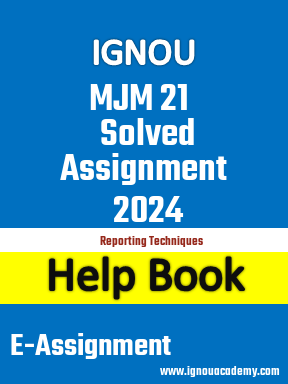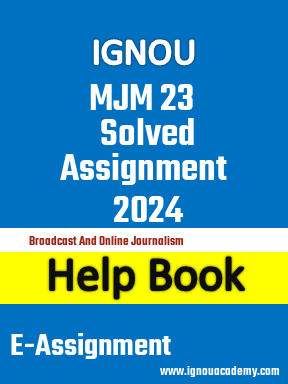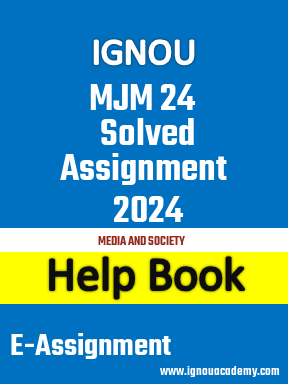My Cart
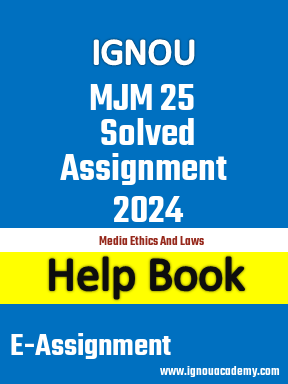
|
|
IGNOU MJM 25 2024 Solution
IGNOU MJM 25 2024 Solution|
|
| Title Name | IGNOU MJM 25 2024 Solution |
|---|---|
| Type | Soft Copy (E-Assignment) .pdf |
| University | IGNOU |
| Degree | PG DIPLOMA PROGRAMMES |
| Course Code | PGJMC |
| Course Name | Post Graduate Diploma in Journalism and Mass Communication |
| Subject Code | MJM 25 |
| Subject Name | Media Ethics and Laws |
| Year | 2024 |
| Session | - |
| Language | English Medium |
| Assignment Code | MJM-025/Assignmentt-1//2024 |
| Product Description | Assignment of PGJMC (Post Graduate Diploma in Journalism and Mass Communication) 2024. Latest MJM 025 2024 Solved Assignment Solutions |
| Last Date of IGNOU Assignment Submission | Last Date of Submission of IGNOU MJM-025 (PGJMC) 2024 Assignment is for January 2024 Session: 30th September, 2024 (for December 2024 Term End Exam). Semester Wise January 2024 Session: 30th March, 2024 (for June 2024 Term End Exam). July 2024 Session: 30th September, 2024 (for December 2024 Term End Exam). |
| Assignment Code | MJM 25/2024 |
|
|
Questions Included in this Help Book
Ques 1.
Private news channels are often criticised for carrying out sting operations unethically. What are the ethical practices and laws governing the use of hidden cameras and recordings without a person's consent and knowledge? Discuss your answer in light of any recent example.
Ques 2.
Discuss the role of codes of ethics in journalism as a professional practice, examining its problematic and positive aspects and whether codes are the most effective way of securing ethical media practice without unduly restraining practitioners
Ques 3.
Fake news and rumour-mongering have become a menace due to the lack of gatekeeping across social media. What, in your opinion, should be the ethical code of self-adherence to reduce the spread of such unidentified news?
Ques 4.
Reading news and seeing gory photographs of riots, wars or accidents can be mentally harassing for the audience. Nevertheless, such reporting is essential from a journalistic view. Is there a need to educate journalists on Trauma Literacy for responsible reporting of accidents or riots? Justify your answer.
Ques 5.
Personal data created by individuals using the internet creates both footprints and fingerprints. Discuss how data-matching on the internet poses new legal and ethical issues for media platforms and practitioners. [Data matching means the use of personal information given in one context (or held on one database) with data given (or held) in another]
Ques 6.
Choose a recent advertising campaign or advertisement that has garnered attention, either positively or negatively, in terms of ethical considerations. Analyze the advertisement using ethical frameworks such as honesty, transparency, social responsibility, and cultural sensitivity. Discuss the potential impact of the advertisement on consumers, society, and the brand's reputation.
Ques 7.
Explore the concept of the Right to Information (RTI) in the context of transparency, accountability, and democracy. Select a case study from your country or region where the RTI has played a significant role in revealing government actions or decisions.
Ques 8.
Examine the complex landscape of privacy in the digital age. Choose a recent case, event, or technology development that has raised significant privacy concerns in the digital space. Analyze the implications of this case on individuals' digital privacy, data protection, and online surveillance.
Ques 9.
Explore the concept of self-regulation in the media industry. Analyze a recent incident or controversy related to media ethics, accuracy, or accountability. Examine the response of media organizations involved in the incidence and assess the effectiveness of their selfregulation measures. Present your analysis in a well-structured essay, and propose recommendations for enhancing self-regulation practices in the media industry.
Ques 10.
Select a case study involving copyright issues in the realm of media, arts, or entertainment. Reflect on the evolving nature of copyright in the digital age and its implications for content creators, consumers, and the creative industry. Discuss the potential reforms or alternative approaches to copyright that may better accommodate the needs of content creators and society.
Ques 11.
Choose a recent advertising campaign or advertisement that has garnered attention, either positively or negatively, in terms of ethical considerations. Analyze the advertisement using ethical frameworks such as honesty, transparency, social responsibility, and cultural sensitivity. Discuss the potential impact of the advertisement on consumers, society, and the brand's reputation.
Ques 12.
Explore the concept of the Right to Information (RTI) in the context of transparency, accountability, and democracy. Select a case study from your country or region where the RTI has played a significant role in revealing government actions or decisions.
Ques 13.
Examine the complex landscape of privacy in the digital age. Choose a recent case, event, or technology development that has raised significant privacy concerns in the digital space. Analyze the implications of this case on individuals' digital privacy, data protection, and online surveillance.
Ques 14.
Explore the concept of self-regulation in the media industry. Analyze a recent incident or controversy related to media ethics, accuracy, or accountability. Examine the response of media organizations involved in the incidence and assess the effectiveness of their selfregulation measures. Present your analysis in a well-structured essay, and propose recommendations for enhancing self-regulation practices in the media industry.
Ques 15.
Select a case study involving copyright issues in the realm of media, arts, or entertainment. Reflect on the evolving nature of copyright in the digital age and its implications for content creators, consumers, and the creative industry. Discuss the potential reforms or alternative approaches to copyright that may better accommodate the needs of content creators and society.
|
|
Related Assignments
IGNOU Doubts & Queries
Click to Contact Us
Call - 9199852182 Call - 9852900088 myabhasolutions@gmail.com WhatsApp - 9852900088